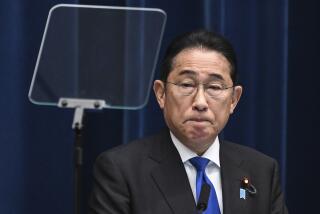Obuchi, Japan’s Mr. Inside, Must Win Over Outsiders
Japan’s next prime minister is mild-mannered and holds a fourth-degree black belt in aikido. He’ll need those gentle skills of self-defense to deflect the hostility of international markets and a fed-up citizenry while he sets out to rescue the Japanese economy.
Keizo Obuchi, 61, is a kindly country gentleman who shuns conflict, hates to make enemies and has spent his entire career as a backstage mediator in the ruling Liberal Democratic Party, or LDP.
The question is whether, after he becomes Japan’s leader next week, Obuchi will be bold enough to tackle this nation’s overweening bureaucrats, failing banks and consumer angst to make the painful structural changes that are seen as essential to revitalizing the gridlocked Japanese economy.
Obuchi’s allies warn against underestimating him. “I expect him to do the things that need to be done, not just the things he has to do to hang on to his job,” said lawmaker Kazuo Aichi, an Obuchi supporter.
Obuchi was elected president of the LDP on Friday by a huge majority, automatically ensuring that he will be voted in Thursday as Japanese prime minister. In selecting Obuchi over two more charismatic rivals, the LDP concluded that his skills as a consensus-builder and the power base he proved by getting more than twice as many votes as either of the other candidates are the right stuff for a Japanese leader who must mobilize this tradition-bound nation within the constraints of a parliamentary system.
But outside the ranks of the LDP, many Japanese express doubt that Obuchi can do anything other than continue the policies of his predecessor, Prime Minister Ryutaro Hashimoto.
Hashimoto bowed out July 13 after the LDP suffered a devastating electoral setback.
Some derided Obuchi as a “mediocre” party animal who typifies the reform-resistant LDP mind-set that voters blame for Japan’s humiliating economic slump.
“The people were saying, ‘No,’ not just to the LDP but to the old system, the old way of doing things, the old way of thinking, but the LDP didn’t hear that,” said Mizuho Fukushima, a lawyer who won election July 12 to the upper house of parliament on the socialist ticket. She won in Tokyo, where the LDP failed to secure even one of the four open seats, a repudiation repeated in urban districts across Japan.
In electing Obuchi, the party is “just changing their face,” Fukushima said. “What’s inside their heads hasn’t changed at all, and that’s a shame.”
The stakes couldn’t be higher for the LDP. If Obuchi succeeds in reviving Japan’s economy and its international credibility, he will be a hero and his party will be restored to voters’ graces, analysts said. But should the economy deteriorate further--and with it Japan’s relations with the United States and its Asian neighbors--Obuchi could be “the last LDP prime minster,” political analyst Minoru Morita said.
Voters in Obuchi’s hometown of Nakanojo in rural Gumma prefecture, northwest of Tokyo, told television cameras in slow, soft accents that they hoped the second son of a silkmaker turned politician would end the hard times.
Obuchi has retained their slow-speaking style, as well as homespun country manners and a modesty that has endeared him to friends and colleagues. But like his mentor, Japanese political godfather Noboru Takeshita, he has quietly but shrewdly courted power, holding a number of key party jobs, then rising to foreign minister under Hashimoto.
When he was 13, his ambitious father sent him to Tokyo to study at Gakushuin, the prep school favored by Japan’s imperial family. But three years later, he entered a public high school in Tokyo. He studied English literature at prestigious Waseda University. A college classmate, Shozen Kanaishi, remembers Obuchi rising each morning at 6, even after late-night drinking bouts, to improve his grasp of English by listening to a popular radio program.
Obuchi met Takeshita through the university debating club, a breeding ground for would-be politicians, and has cleaved to him ever since, a relationship that has yielded huge political dividends but also opened Obuchi to charges that he is a Takeshita mouthpiece.
“He’s like Takeshita’s wife, always walking two or three steps behind him,” said Toshiyuki Takahashi, a senior Yomiuri newspaper editor who has followed Obuchi since 1977. “That’s how much Obuchi respects [Takeshita], and how close they are.”
But Obuchi also has been loyal to colleagues, who repaid him Friday with their votes. “In the political world, there’s a lot of betrayal and backstabbing, but he [Obuchi] absolutely never does that, and so people can stay close to him,” Takahashi said. “That is very rare in politics.”
After his father’s death, Obuchi was elected to his seat in parliament at age 26. When he arrived at the parliament building to take office, he brought along his mother. Hailing from a district with three LDP legislators, he was always overshadowed by two political giants, former Prime Minister Yasuhiro Nakasone and the late Takeo Fukuda. With characteristic humility, Obuchi referred to himself as “the soba [noodle] shop between two skyscrapers.”
Obuchi received vital backing from Takeshita’s former mentor, legendary former Prime Minister Kakuei Tanaka--but when Takeshita finally broke with Tanaka, Obuchi stuck with Takeshita. The Tanaka family has never forgiven him.
“We were betrayed,” said Makiko Tanaka, the fiery daughter of the the late prime minister who is now a respected LDP lawmaker herself. She said her father had told Obuchi that he was not cut out to be a politician, but Obuchi was so determined that the elder Tanaka relented and paid his campaign bills.
“He’ll do anything for a post,” Makiko Tanaka said, adding that party elders will find Obuchi a convenient prime minister because “he’s very easy to handle.”
Others say that, despite his experience as foreign minister, Obuchi is hardly urbane. When receiving a visiting head of state from a small country this spring, Obuchi forgot that he had met the leader before, and, in front of the visiting dignitary, asked aides in Japanese, “Have I met this person? These gaijin [foreigners] all look alike,” according to someone in the room at the time.
But many are warmed by his kindness. Last week, he found time in his busy campaign schedule to extend his personal condolences to the family of a Japanese member of a U.N. peacekeeping mission killed on assignment in Tajikistan.
Obuchi also demonstrated a sense of humor last week. After the Japanese media picked up and trumpeted a remark by an American political analyst that Obuchi had “all the pizazz of cold pizza,” the candidate had a pizza delivered to the reporters camped outside his house and urged them to eat it while it was still hot.
Supporters say one of Obuchi’s finest achievements was his skillful reversal of Japan’s stance on land mines. As foreign minister, he was instrumental in quietly persuading government agencies to support the international ban on the devices, and Hashimoto ultimately signed the accord.
Moreover, analysts said, Obuchi has risen to the task of conducting a public campaign for the prime minister’s post. He managed to avoid a direct debate with his two rivals--a contest most thought he would lose--but doggedly appeared on TV program after TV program alongside the more telegenic Health Minister Junichiro Koizumi and the markets’ favorite, Seiroku Kajiyama.
Obuchi stepped up to the plate by outlining specific measures to reform the economy, including a $70.9-billion stimulus package this year and $42.5 billion in tax cuts next year, and his circumlocutory-speaking style became more direct as the campaign progressed.
He has also taken pains to spice up his bland image. He wore an unbecoming tie to an important TV appearance because it had been a birthday present from his daughter, said Masayuki Fukuoka, professor of Hakuo University, who was on the same talk show. But after being advised that the effect was downbeat, Obuchi appeared the next day in a cheerful yellow tie.
Obuchi’s victory Friday was accompanied by more unrelenting bad news for the Japanese economy. Department store sales plunged 6% in the first half of the year, crude oil imports fell 0.8% because of anemic domestic demand, and government bond prices sagged.
Obuchi said his top priority is to “reconstruct the Japanese economy and relieve the people’s uncertainty.”
Obuchi also promised to put fresh faces into his new Cabinet.
A key indicator of whether Obuchi means business will be his pick for finance minister, “which is really the key to establishing the credibility of this administration,” Columbia University professor Gerald L. Curtis said.
The resurgent opposition will demand to put its stamp on the key financial rescue package that Obuchi must get through parliament next month, but is unlikely to try to stymie passage for fear of being viewed as unpatriotic and obstructionist, analysts said. But come September, they may be sharpening their knives for Obuchi.
“We look forward to fighting him in parliament,” said Yukio Hatoyama, secretary-general of the opposition Democratic Party of Japan.
Efron discusses the selection of Japan’s next premier on The Times’ Web site at: https://www.latimes.com.
* PROBLEMS AHEAD: As Japan’s next prime minister, Keizo Obuchi has a laundry list of economic woes to tackle. D1
More to Read
Sign up for Essential California
The most important California stories and recommendations in your inbox every morning.
You may occasionally receive promotional content from the Los Angeles Times.










